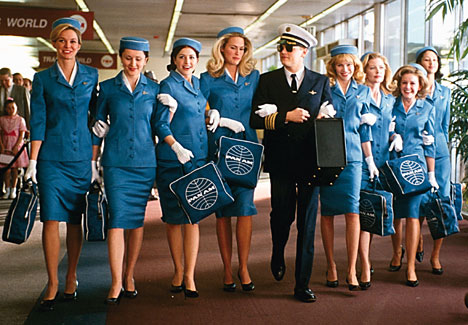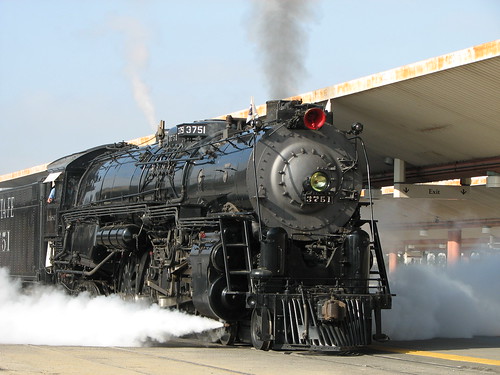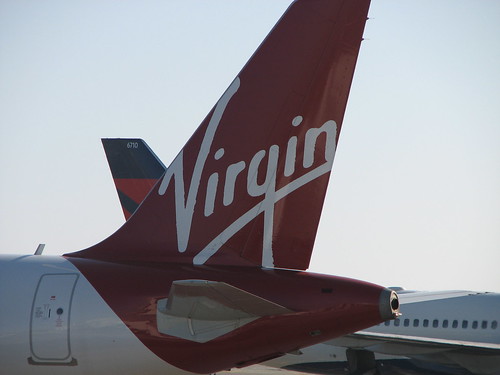 |
| Courtesy of Wellcultured.com |
Sure, flying is a way to get a group of people from one place to another, but can you really lump it into the "public transportation" category? According to
an article from Travel + Leisure, the days of fancy air travel, well-dressed patrons and prim-and-proper stewardesses are long gone; replaced with cramped seats, low-budget service and socially detached airline personnel. Even though traveling by plane is no longer the elegant event it used to be, I could never classify it the same way as buses, trains and subways. But let's face it, that may be where it's heading, just one more way to get from point A to point B, without any style, flare or social interaction. I mean, isn't that what happened to train travel in this country?
 |
| From flickr, by mark_v_socal |
Back in the glory days of the locomotive, train cars were outfitted with velvet chairs, white-linen table cloths, immaculate chandeliers, specially carved bars and actual beds. Now, the bar car is a bland box of linoleum, seats face only two directions, tables are attached to the walls, and beds fold down like ironing boards. And what about the train conductors with their three-piece suits, golden stop watches and whistles screaming "all aboard?" They're gone, too. Such is the world of the airplane. Back in the early 40s, planes also had that chic decor and swanky clientele, and a flight was a real enjoyable travel experience. Stewardesses, also referred to as "fly girls," served champagne and full-fledged meals, all while dressed in alluring outfits and adorable hats. Not only did stewardesses wear different clothes than the flight attendants of today, but their dedication to serving the customer was something to be admired. They went out of their way to make sure passengers were comfortable, had everything they wanted and got to their destinations with little to no complaints. They even had conversations with passengers, getting to know the stylish businessmen who were jetting off to their next meeting. Today, it seems like flight attendants just want to get passengers boarded, seated and quiet, and then just as quickly get them off the plane. There's no more panache to air travel.
I find this revelation to be rather sad, because I truly enjoy flying. I love knowing that I am going to be on a plane, traveling somewhere different, or perhaps someplace familiar--it all depends on my travel plans. But the fact is, I still get excited to board a plane, to watch the airport grow smaller as we ascend into the air, to feel the drop in my stomach as the wheels go up and the plane is floating. I still think of it as something special. And yet I know there are few who feel the way I do about having to fly. They look at it as a chore, an obligation to get them to their destination. It's uncomfortable, frustrating, expensive, and they just want it over with as soon as possible. So what can be done?
 |
| From Flickr, by mark_v_socal |
I was discussing this issue with my boyfriend, and he shrewdly observed that airlines need to use this in their favor to gain more business. Then he mentioned Virgin America's plan to make flying a more enjoyable experience for passengers, and it stirred my curiosity. In a recent
article from Bloomberg Businessweek, Virgin America's unconventional ways were put to the test to see how they could fare in this competitive industry. Founder and CEO of Virgin Group, Richard Branson, made a remark to employees and press as the first Virgin America flight came into Dallas-Fort Worth Airport: "You can either go on that other carrier and get their kind of service...or you can come on the Virgin carrier and have a blast." The airline has a philosophy known as fun in the skies, and it has shown promise in the last three years. Their Airbus A319 and A320 feature entertainment in every seat-back and have free Wi-Fi internet access. Even though competition is tough and the airline has had its fair share of struggles, Branson believes it has something truly special to offer customers: great service. He says that other airlines do not think of the passengers at all, it's become like a bus service. (Sounds familiar, right?) So Branson has dedicated most of his efforts to improving customer service and design. When they ordered their first line of planes, Virgin wanted to equip them with leather seating, translucent barriers between sections so as to reduce that claustrophobic feel, touchscreen entertainment systems that let passengers select movies and shows on command, and the ability to have food and drinks ordered from the seats whenever it was desired. LED-lighting would also be installed in the cabins to improve ambiance and overall mood.
While these amenities certainly bring back some memories of the early days of air travel when passengers were excited about flying and truly enjoyed their experience on planes, it does not mean that Virgin America will prosper, especially with other airlines doing their best to make sure it fails. But if Virgin's ways cannot get them to the top of the airline industry, they are at least pushing other airlines to instill some of these concepts on their planes. In fact, Delta and United are already starting to install Wi-Fi on their flights, Continental is looking into satellite television and mood-lighting is being put into many of Boeing's new models.
Even if the days of stewardesses, smartly dressed business men, luxury seating and impeccable service are long gone, there is still hope that air travel will not lose its cache. And if airlines like Virgin America continue to keep the passenger as their main focus, we might be welcoming a whole new era of air travel, where--hopefully--the champagne will be flowing.



No comments:
Post a Comment